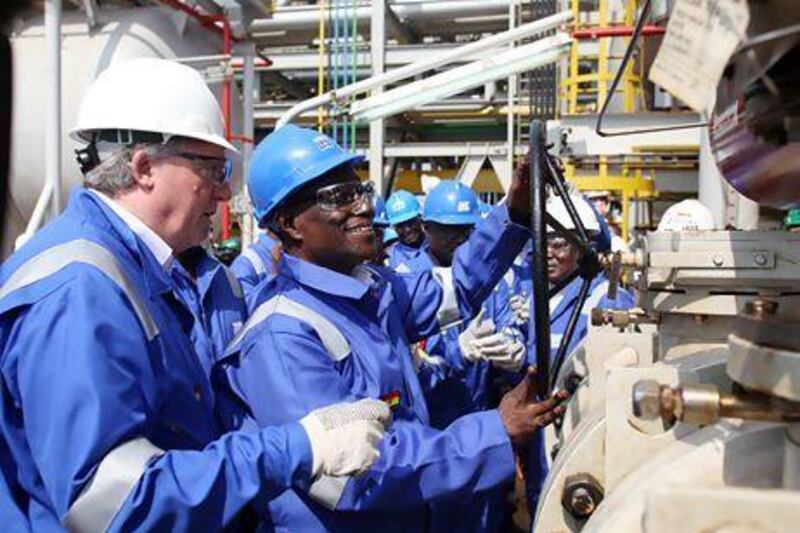Ghana, regarded as one of Africa's brightest prospects, is struggling to reap the benefits of its oil and gas reserves, as production targets are missed and crippling power shortages belie its hydrocarbon wealth.
Like many of its regional peers, Ghana is the beneficiary of an oil and gas boom that began when smaller oil companies started exploring the potential of the countries near the Horn of Africa.
Whereas Nigeria and Angola had for a while been home to substantial production, it took some time before nimble outfits struck sizeable reserves off the shores of Ghana, Tanzania and Mozambique. Oil has also been found in Kenya's rift valley, known as the "cradle of mankind".
Ghana is a little ahead of the other newcomers and oil was found at its offshore Jubilee field in 2007. Production started at the end of 2010 by a consortium built around the British company Tullow Oil.
Located 80km from the coast of Takadori, the capital of the country's Western Region that has morphed into an oil town, the Jubilee field has proven oil reserves of 800 million barrels, and about 1 billion barrels of probable reserves.
But extracting these reserves has not been as straightforward as planned and Tullow fell short of last year's production targets of 90,000 barrels per day (bpd). The company nevertheless hopes to pump an average 120,000 bpd this year and 200,000 bpd by 2015.
As efforts to increase production are behind schedule, oil revenues have so far also been disappointing. Last year, the Ghanian treasury received US$540 million (Dh1.98 billion) from the oil industry, significantly less than the projected $774m.
This has not prevented the government from adopting a generous spending regime. Overall state spending will increase by 20 per cent this year, the finance minister Seth Terkper announced last month, as the government is increasing infrastructure expenditure and is boosting civil sector pay.
To accommodate this largesse, plans to trim the budget deficit to 6 per cent of GDP from 12 per cent last year have been replaced with a new target of 9 per cent, to the detriment of the country's finances. The ratings agency Fitch has already downgraded Ghana's credit rating from a stable to a negative outlook.
Credit ratings determine the cost of government borrowing and have an impact on investor confidence.
The government in Accra, Ghana's capital, is also faced with the popular perception that the country's oil wealth has made little difference to everyday life.
This is in no small part due to the disastrous state of Ghana's utility sector, which is proving incapable of providing sufficient amounts of power and water.
The power shortage is largely the result of delays to developing the Jubilee field's natural gas reserves.
The Ghana National Gas Company (GNGC) has missed several deadlines for the completion of a project that would deliver gas from the field to the power plants on land.
First touted to come online at the end of last year, GNGC now expects its facilities to distribute Jubilee field gas in the fourth quarter of next year.
The delay is critical because Ghana's gas supplies from Nigeria were interrupted after the West African Gas Pipeline fell into disrepair last August.
Ghana's power plants rely on natural gas and the outage forced the state utility, the Volta River Authority, to ration electricity. Since the August, households have had their electricity cut off during daylight hours.
"What we are going through has been the result of disruptions of gas deliveries to our plants," said John Mahama, Ghana's president, adding that he was "aware of the importance of making natural gas available from the Jubilee field".
Mr Mahama said he aimed to double power generation capacity to 5,000 megawatts by 2016, and hopes to export electricity to adjacent countries in two years' time.
His administration is also keen to put an end to the severe shortage of fresh water, which is forcing companies to buy expensive water from private suppliers and puts at risk the health of Ghanaians.
To achieve these ambitious targets, the government has turned to the international private sector to improve its power and water infrastructure.
The first such investment in the power sector is held by a UAE firm, Abu Dhabi National Energy Company, or Taqa, which owns Ghana's first independent power project (IPP). IPPs are privately-owned power plants that sell electricity to the government at a profit.
Taqa recently started upgrading its plant in Takoradi and is keen on further power projects in the country. It also has an eye on projects that could process the gas needed by power plants.
"There will be significant gas associated with those offshore developments, and that … is there to be processed," said Carl Sheldon, Taqa's chief executive.
"That is something that would fit us very well both on the processing side and on the power side."
The interest by outside investors is encouraging and the overall picture is not a grim one either.
Ghana's $35bn economy is projected to grow 8 per cent this year, well above average in West Africa. But its oil story has yet to deliver and further delays threaten to curb economic growth and prevent improvements to the lives of ordinary Ghanaians.





